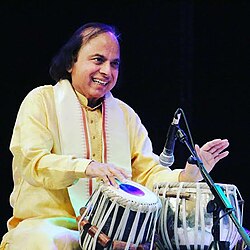Taalyogi Pandit Suresh Talwalkar | |
|---|---|
 Talwalkar playing the Tabla | |
| Background information | |
| Born | 20 July 1948 Mumbai, Bombay State, India |
| Genres | Hindustani classical music |
| Instrument(s) | Tabla |
| Website | Pandit Suresh Talwalkar |
Taalyogi Pandit Suresh Talwalkar (born 1948) is an Indian musician who plays the percussion instrument Tabla.
Performing career
[edit]Talwalkar was born in 1948 into a Marathi family in Chembur, Mumbai. He belongs to the Keertankar family of Shri Dholebuva. Keertana being a classical form of devotional and musical discourse, a liking for the classical music was inculcated in him right in the childhood. He initially learned playing the tabla from his father Dattatrey Talwalkar.[1][2] He was trained under the tutelage of i.e. his gurus were Pandit Pandharinath Nageshkar, Pandit Vinayakrao Ghangrekar, Pandit Gajananbuva Joshi, Pandit Nivruttibuva Sarnaik and Ramkrishna Dholebuva (and from many others) and studied the rhythm theory of Carnatic music from Pandit Ramnaad Ishvaran.[2][3][4]
His style draws from several gharanas (stylistic schools) and he accompanied classical musicians and dancers;[2] Talwalkar frequently used to perform with sarangi player Pandit Ram Narayan since the late 1960s. He also accompanies classical singer Pandit Ulhas Kashalkar. He has toured in the United States, Europe, and Africa.[5][6][7] He taught Tabla, Pakhawaj, Western drums, etc. Some of his disciples are Pandit Ramdas Palsule, Pandit Vijay Ghate, etc.[2] Talwalkar was awarded the All India Radio Award in 1966, the Sangeet Natak Akademi Award in 2004[2][8] and Padma Shri in 2013.[9]
Personal life
[edit]Talwalkar is married to classical singer Vidushi Padma Talwalkar. They have a daughter, Savani Talwalkar, who is a tabla player, and a son, Mumbai businessman and tabla player Pandit Satyajit Talwalkar.[10][11]
Title
[edit]The title TaalYogi was conferred on Suresh Talwalkar by His Holiness Jagatguru Shankaracharya Shri Vidya Shankar Bharthi, Karveer Peeth, Kolhapur in 2001.
His Disciples
[edit]- Pandit Vijay Ghate
- Pandit Ramdas Palsule
- Pandit Vishwanath Shirodkar
- Pandit Satyajit Talwalkar (his son)
- Pandita Savani Talwalkar (his daughter)
- Pandit Supreet Deshpande
- Milind Kulkarni
- Tanmay Deochake
- Aashay Kulkarni
- Mayank Bedekar
- Omkar Dalvi
- Ishan Paranjpe
- Swapnil Bhate
- Gandharva Chumble
Awards
[edit]- Talwalkar received the Padma Shri in 2013.
- He was awarded the All India Radio Award in 1966
- Andhra Pradesh Government Award in 1998
- ‘Tyagaraj Award’ by Shri Naad Bramha, Chembur in 2002
- Sangeet Natak Academi Award in 2004, Awarded by The President of India Dr. A.P.J. Abdul Kalam Azad
- ‘Vishnu Digambar Paluskar’ Award by Gandharva Mahavidyalaya, Pune in 2004
- ‘Ratna Puraskar’ awarded by Swarsadhana, Mumbai in 2008
- ‘Sangeet Poornacharya’ Title Awarded by His Holiness Poornavad Vardhishnu Param pujya Shri Vishnu Maharaj Parnekar in 2008
- ITC Sangeet Research Academy Award, Kolkata, West zone of India in 2009
- Honoured by Swar-Sadhana, Pandharpur in 2009
References
[edit]- ^ Sinha, Manjari (13 May 2010). "Tunes of the soul". The Hindu. Archived from the original on 4 February 2013. Retrieved 1 July 2010.
- ^ a b c d e "SNA: Events 2005-2006". Sangeet Natak Akademi. Archived from the original on 21 July 2011. Retrieved 1 July 2010.
- ^ Naimpalli, Sadanand (2005). Theory and Practice of Tabla. Popular Prakashan. p. 108. ISBN 81-7991-149-7.
- ^ "About Panditji's Gurus".
- ^ "Narayan, maître du sarangi, en récital à Montréal" [Narayan, master of sarangi, performs in Montreal]. Le Devoir (in French). 27 November 1981. p. 18.
- ^ Swaminathan, G. (6 January 2009). "Highlighting the ragas' beauty". The Hindu. Archived from the original on 6 November 2012. Retrieved 1 July 2010.
- ^ "March to a different drummer at tabla gig". The Nation. 21 February 1997. p. C7.
- ^ "SNA: List of Akademi Awardees – Instrumental – Tabla". Sangeet Natak Akademi. Archived from the original on 17 April 2010. Retrieved 1 July 2010.
- ^ "Padma Awards" (PDF). Ministry of Home Affairs, Government of India. 2015. Retrieved 21 July 2015.
- ^ Shaikh, Asseem (15 December 2009). "Singer's house burgled; gold, jewellery worth Rs 6.74 lakh stolen". The Times of India. Archived from the original on 18 December 2009. Retrieved 1 July 2010.
- ^ "The Beat of a Guru". The Nation. 15 March 1997. p. C1.
External links
[edit]- "Taalyogi Pandit Suresh Talwalkar". Official website.
- Suresh Talwalkar at AllMusic
| International | |
|---|---|
| National | |
| Artists | |
| Other | |